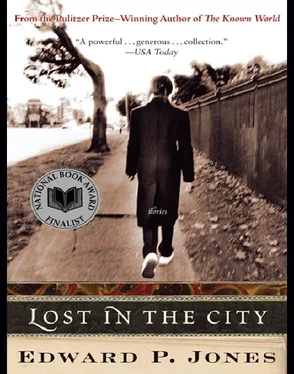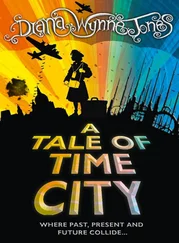He had been seeing Janet Gordon for two years, and about three or four times a month, they would take in a movie or a show at the Howard and then spend the night at a tourist home. But after the incident at Peoples, he saw Janet only once or twice a month. Then he began taking his daughter with him in the cab on most Saturdays. He tried to make it seem as if it were a good way to see the city.
Despite his reasons for taking her along, she enjoyed riding with him at first. She asked him for one of his old maps, and, with a blue crayon, she would chart the streets of Washington she had been on. Her father spent most of his time in Southeast and in Anacostia, but sometimes he went as far away as Virginia and Maryland, and she charted streets in those places as well. She also enjoyed watching him at work, seeing a part of him she had never known: The way he made deliberate notations in his log. Patted his thigh in time to music in his head until he noticed her looking at him. Raised his hat any time a woman entered or left the cab.
But the more she realized that being with him was just his way of keeping his eye on her, the more the travels began losing something for her. When she used the bathroom at some filling station during her travels, she found him waiting for her outside the bathroom door, his nail-bitten hands down at his sides, his hat sitting perfectly on his head, and a look on his face that said Nothin. Nothin’s wrong. Before the autumn of 1961 had settled in, she only wanted to be left at home, and because the incident at Peoples was far behind them, he allowed it. But he went back to the old ways of checking up on her. “Tell him yes,” she would say when Miss Jenny called out her back window. “Tell him a million times yes, I’m home.”
Little by little that spring and summer of 1961 Myrtle Street emptied of people, of families who had known no other place in their lives. Robert dreaded coming home each evening and seeing the signs of still another abandoned house free to be picked clean by rogues coming in from other neighborhoods: old curtains flapping out of screenless windows, the street with every kind of litter, windows so naked he could see clean through to the backyard. For the first time since he had been knowing her, Miss Jenny did not plant her garden that year, and that small patch of ground, with alien growth tall as a man, reverted to the wild.
He vowed that until he could find a good place for himself and his child, he would try to make life as normal as possible for her. He had never stopped rising each morning before Betsy Ann and going out to the coop to see what pigeons might have died in the night. And that was what he did that last morning in midautumn. He touched down onto the roof and discovered it had snowed during the night. A light, nuisance powder, not thick enough to cover the world completely and make things beautiful the way he liked. Though there was enough sunlight, he did not at first notice the tiny tracks, with even tinier, intermittent spots of blood, leading from the coop, across his roof and over to the roof of the house next door, the schoolteacher’s house that had been empty for more than four months. He did, however, hear the birds squawking before he reached the coop, but this meant nothing to him, because one pigeon sound was more or less like another to him.
The night before there had been sixteen pigeons of various ages, but when he reached the coop, five were already dead and three were in their last moments, dragging themselves crazily about the floor or from side to side in the lower cubicles. Six of them he would kill with his own hands. Though there were bodies with holes so deep he saw white flesh, essence, it was the sight of dozens of detached feathers that caused his body to shake, because the scattered feathers, more than the wrecked bodies, spoke to him of helplessness. He closed his eyes as tight as he could and began to pray, and when he opened them, the morning was even brighter.
He looked back at the window, for something had whispered that Betsy Ann was watching. But he was alone and he went into the coop. He took up one dead bird whose left wing and legs had been chewed off; he shook the bird gently, and gently he blew into its face. He prayed once more. The pigeons that were able had moved to the farthest corner of the coop and they watched him, quivering. He knew now that the squawking was the sound of pain and it drove him out of their house.
When he saw the tracks, he realized immediately that they had been made by rats. He bent down, and some logical piece of his mind was surprised that there was a kind of orderliness to the trail, even with its ragged bits of pigeon life, a fragment of feather here, a spot of blood there.
He did not knock at Walter and Miss Jenny’s door and wait to go in, as he had done each morning for some thirteen years. He found them at the breakfast table, and because they had been used to thirteen years of knocking, they looked up at him, amazed. Most of his words were garbled, but they followed him back upstairs. Betsy Ann had heard the noise of her father coming through the kitchen window and bounded down the stairs. She stood barefoot in the doorway leading from the front room to the kitchen, blinking herself awake.
“Go back to bed!” Robert shouted at her.
When she asked what was the matter, the three only told her to go back to bed. From the kitchen closet, Robert took two burlap sacks. Walter followed him out onto the roof and Betsy Ann made her way around Miss Jenny to the window.
Her father shouted at her to go to her room and Miss Jenny tried to grab her, but she managed to get onto the roof, where Walter held her. From inside, she had heard the squawking, a brand new sound for her. Even with Walter holding her, she got a few feet from the coop. And when Robert told her to go back inside, she gave him the only no of their lives. He looked but once at her and then began to wring the necks of the birds injured beyond all hope. Strangely, when he reached for them, the pigeons did not peck, did not resist. He placed all of the bodies in the sacks, and when he was all done and stood covered in blood and viscera and feathers, he began to cry.
Betsy Ann and her father noticed almost simultaneously that there were two birds completely unharmed, huddled in an upper corner of the coop. After he tied the mouths of the sacks, the two birds, as if of one mind, flew together to the landing board and from there to the oak tree in Miss Jenny’s yard. Then they were gone. The girl buried her face in Walter’s side, and when the old man saw that she was barefoot, he picked her up.
She missed them more than she ever thought she would. In school, her mind would wander and she would doodle so many pigeons on the backs of her hands and along her arms that teachers called her Nasty, nasty girl. In the bathtub at night, she would cry to have to wash them off. And as she slept, missing them would take shape and lean down over her bed and wake her just enough to get her to understand a whisper that told her all over again how much she missed them. And when she raged in her sleep, Robert would come in and hold her until she returned to peace. He would sit in a chair beside her bed for the rest of the night, for her rages usually came about four in the morning and with the night so near morning, he saw no use in going back to bed.
She roamed the city at will, and Robert said nothing. She came to know the city so well that had she been blindfolded and taken to practically any place in Washington, even as far away as Anacostia or Georgetown, she could have taken off the blindfold and walked home without a moment’s trouble. Her favorite place became the library park at Mount Vernon Square, the same park where Miss Jenny had first seen Robert and Clara together, across the street from the Peoples where Betsy Ann had been caught stealing. And there on some warm days Robert would find her, sitting on a bench, or lying on the grass, eyes to the sky.
Читать дальше












